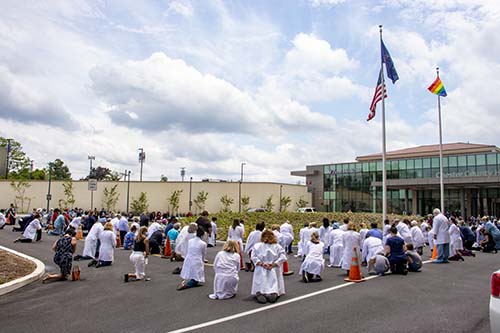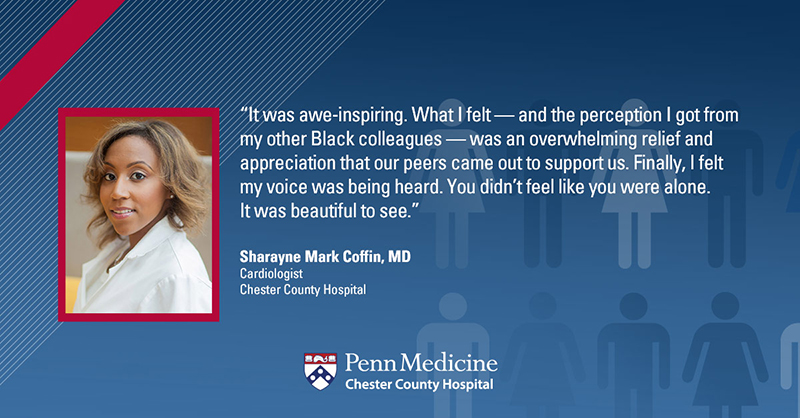
In Minneapolis, they rallied downtown.
In Kansas City, they stood in solidarity near the State Capitol.
In Denver, they walked along a major interstate highway in a peaceful demonstration.
Protests have occurred around the globe in response to George Floyd's death on May 25, 2020. From marches to murals to moments of silence, demonstrations took place in at least 140 US cities, as well as hundreds more abroad, as people have found ways to honor George Floyd and show their support for the black community and the Black Lives Matter movement.
In Chester County, Pennsylvania, Chester County Hospital held its own demonstration. On June 5, 2020, physicians and staff knelt in silent protest of the injustices the black community faces every day. They were joined by colleagues at Penn Medicine and physicians from the Children’s Hospital of Philadelphia, who participated in the silent demonstration from Franklin Field in Philadelphia.
As Dr. Swapna Gummadi, MD, hospitalist at Chester County Hospital and one of the lead organizers of the demonstration, explains, "Racism is the biggest health crisis of our generation." Since the founding of the United States, the black community has faced a pandemic of racism, and the recent deaths of individuals including George Floyd, Ahmaud Arbery, Breonna Taylor, Tamir Rice, Eric Garner, among countless others have highlighted this systemic issue.
At the same time, the COVID-19 pandemic has disproportionately taken the lives of black Americans, who have been dying at three times the rate of white Americans.
"Everything we have done for the past few months fighting COVID-19 was to help our patients breathe. It is heartbreaking to hear someone say "I can't breathe" and not be able to do something about it," says Dr. Gummadi, in reference to Mr. Floyd's statement to the police officer, who kept his knee on Mr. Floyd's neck for nearly 8 minutes, eventually leading his death.
In an email to her colleagues, Dr. Sharayne Mark Coffin, MD, cardiologist at Chester County Hospital and another lead organizer, wrote, "Racial inequality is not new. But with the advent of social media, it has been on raw display of late. There is a call now stronger than ever for racial equality and justice."
For CCH physicians, this call turned into a demonstration meant to promote meaningful change. Physicians and staff believe it is their duty to be advocates for equality both in healthcare and beyond, and this event was just one small way of supporting a movement that is nowhere near being complete.
A Mission of Equality in a Nation of Inequality
Over 120 years ago, in 1892, the original charter for Chester County Hospital was documented. It included the promise that CCH would "be open to all classes, without distinction of color or creed." This sentiment is deeply ingrained in the mission of CCH, intended to promote equality in healthcare in a country that was founded on harsh inequalities.
Fast forward to the present day, and while the hospital still maintains a mission of equality, the nation at large does not always reflect those values. From economic to social to safety factors, black Americans still face gaping inequalities in all facets of life.
Currently, black Americans are facing two pandemics - coronavirus and police violence.
These two pandemics are not unrelated. In fact, they are more intertwined than some may be aware of. "They're both equally important," says Dr. Mark. "And they both exist because of systemic racism."
Systemic racism is a reference to systems in the US that not only create but also maintain racial inequality in nearly every aspect of life for people of color. These systems include - but are certainly not limited to - education, healthcare, and the economy.
As a physician and a black woman herself, Dr. Mark is all too aware of these pandemics facing the black community in the US. After the death of George Floyd, she took to a medium many Americans are utilizing to promote change - social media.
How a Facebook Group Ignited a Movement in Chester County
From images to resources to conversations, social media accounts across the country erupted in protest against the death of George Floyd and the racial injustice in America. In Chester County, Dr. Mark found her own way to engage in the conversation.
As a part of a Facebook group for Philadelphia physicians who are mothers, Dr. Mark posed a question in response to another member's post asking how everyone was handling looting. She wrote, "Has anyone in this group asked, "How are your black colleagues doing with the recent death of George Floyd?"" She says she felt it was critical to acknowledge and unpack what precipitated these looting events rather than solely focusing on those events.
"From that, there was a very positive conversation, and it led to a new conversation about how our black colleagues are doing in this group," explains Dr. Mark. Physicians across Philadelphia began to ask the group how they could support their black colleagues and improve racism in their own communities.
A plan began to take shape. One member had recently learned of a demonstration taking place on June 5 organized by White Coats for Black Lives - a medical student-run organization whose mission is to protect the health, well-being, and self-determination of patients of color through the elimination of racism in medicine - and they saw an opportunity.
"Within 24 hours, it was organized at most major hospitals in Philly and the suburbs for this movement - a silent protest, where we would kneel for 8 minutes and 46 seconds, the length of time it took for George Floyd to die with an officer's knee on his neck," says Dr. Mark. "The intention was to stand in solidarity with ending racism and bringing awareness to the current inequalities nationwide, in particular in the healthcare system."
An Event Ignited by Sorrow - But Full of Reflection
Dr. Mark';s colleague, Dr. Gummadi took the lead in organizing the demonstration at Chester County Hospital. She got approval from the CCH administration, who was strongly supportive of the demonstration in order to create real, meaningful change.
This sentiment was reflected in CEO Mike Duncan's earlier communications with the hospital. In an email to the CCH community, he wrote, "In Chester County, there are only a few organizations that have a prominent voice - and we are one of them. As we learn through dialogue how we can make things better at Chester County Hospital, we will be engaging with community leaders to influence the community for the good of all."
With the backing of hospital leaders, on June 5, over a hundred physicians, staff, and family members showed up to take part in the demonstration.
At exactly 1 p.m., everyone fell silent and kneeled in unison. And for the next 8 minutes and 46 seconds, the time outside Chester County Hospital existed to honor George Floyd's life and show support for the black community.
Initially, the atmosphere was solemn, recalls Dr. Mark. But she says there were also moments of hope.

Beyond Demonstrations: Taking Action to Promote Meaningful Change
According to Dr. Mark, the critical achievement of the demonstration at CCH was an awareness of the systemic issues of racism, particularly the inequity in healthcare. "It was powerful to come together in a silent, peaceful protest and bring awareness to the issues at hand," she explains.
However, the movement is not over - and physicians across the country have an important journey ahead of them. "First and foremost, [physicians] have to recognize their biases in caring for black patients," says Dr. Mark. "There are things that are done inherently or subconsciously that they don't even realize."
The Role of Race in Healthcare
One way race may impact healthcare is in regard to social determinants of health, which play a critical role in a person's well-being. Factors such as education, socioeconomic status, and access to simple things like healthy food and healthcare can all impact health outcomes.
"Instead of placing blame solely on the patient, we need to recognize that there's a systemic issue," Dr. Mark says. "There are things that are outside of their control, and we need to meet them where they're at to help them achieve better outcomes."
She reminds her colleagues that this approach may not be something that has been taught in medical school, and it may be necessary to think outside of the box.
In addition, physicians must recognize an inherent distrust that the black community may have when it comes to the healthcare system. She explains that moments in history cannot be ignored, as they highlight the injustices black Americans have had to face in the past.
For instance, from 1932 to 1972, the Tuskegee Syphilis Study left hundreds of African American men with syphilis untreated for 40 years so scientists could study the effects of the disease. At least 7 men lost their lives from syphilis, and more than 150 from heart failure that may have been related.
In a similar injustice, in 1951, a doctor took cells from the cervix of an African American woman named Henrietta Lacks without telling her - only to have medical researchers commercialize them and profit millions of dollars without Henrietta ever knowing.
These moments in history can impact the way black Americans view their relationship with their physicians. "They may not want to take a certain medication because they do not want to feel like they're being experimented on," Dr. Mark explains. "If you don't get that trust, you're not going to accomplish anything."
The Role of the Community in Promoting Change
Change doesn't only rest on the shoulders of physicians - the community at large has just as important of a role.
"Get involved in legislation, donate to organizations that are working toward changing the laws, and educate your family members - your children and friends. Tell them not to be racist. Educate yourself on systemic racism," she says. "Don't be silent. Don't be complacent."
This type of change does not occur overnight. The Civil Rights Movement lasted roughly 20 years, but it led to important laws that protect black Americans from employment, housing, and voting discrimination to this day.
"At this point, it can't be ignored," says Dr. Mark. "What we did grasped everyone's attention, and people are being held accountable."
In her email to her CCH colleagues, Dr. Mark quoted Dr. Martin Luther King Jr., "There comes a time when people get tired of being pushed out of the glittering sunlight of life's July and left standing amid the piercing chill of an alpine November."
At Chester County Hospital, physicians share this critical sentiment of Dr. King. They are tired of seeing black Americans being pushed out of the glittering sunlight that they have fought tirelessly for. Through support, education, and awareness, they stand at the ready to support their colleagues, patients, and community members in this fight.